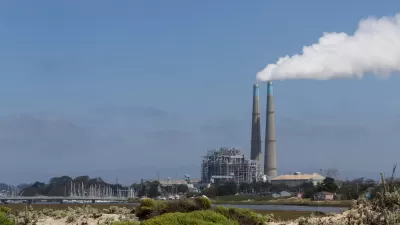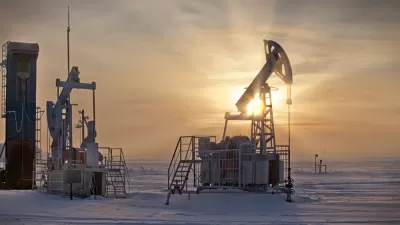The National Academy of Science has released a report showing that health effects from burning fossil fuels cost the economy about $120 billion a year. Global warming was not included due to uncertainty, so it's focused mostly on air pollution.
The report, ordered by Congress, focuses almost exclusively on coal and oil, with the former accounting for $62 billion in 'hidden costs' per year. Electricity generation, heating and driving are the main activities studied. Heavy-duty trucks were included but trains, ships, and planes were not.
"The largest portion of this is excess mortality - increased human deaths as a result of criteria air pollutants emitted by power plants and vehicles," said Jared L. Cohon, president of Carnegie Mellon University in Pittsburgh, who led the study committee.
Coal burning was the biggest single source of such external costs . The damages averaged 3.2 cents per kilowatt-hour, compared with 0.16 cents for (natural) gas. But the variation among coal plants was enormous. The worst plants, generally the oldest and burning coal with the highest sulfur content, were 3.6 times worse than the average, with a cost of nearly 12 cents per kilowatt-hour (which is more than the average retail price of that amount of electricity)."
From National Academies press release:
"The report assesses what economists call external effects caused by various energy sources over their entire life cycle -- for example, not only the pollution generated when gasoline is used to run a car but also the pollution created by extracting and refining oil and transporting fuel to gas stations."
Damages From Motor Vehicles and Fuels
"Transportation, which today relies almost exclusively on oil, accounts for nearly 30 percent of U.S. energy demand. In 2005 motor vehicles produced $56 billion in health and other nonclimate-related damages, says the report. The committee evaluated damages for a variety of types of vehicles and fuels over their full life cycles, from extracting and transporting the fuel to manufacturing and operating the vehicle. In most cases, operating the vehicle accounted for less than one-third of the quantifiable nonclimate damages, the report found."
Thanks to Gladwyn d'Souza
FULL STORY: Fossil Fuels’ Hidden Cost Is in Billions, Study Says

Maui's Vacation Rental Debate Turns Ugly
Verbal attacks, misinformation campaigns and fistfights plague a high-stakes debate to convert thousands of vacation rentals into long-term housing.

Planetizen Federal Action Tracker
A weekly monitor of how Trump’s orders and actions are impacting planners and planning in America.

Chicago’s Ghost Rails
Just beneath the surface of the modern city lie the remnants of its expansive early 20th-century streetcar system.

Bend, Oregon Zoning Reforms Prioritize Small-Scale Housing
The city altered its zoning code to allow multi-family housing and eliminated parking mandates citywide.

Amtrak Cutting Jobs, Funding to High-Speed Rail
The agency plans to cut 10 percent of its workforce and has confirmed it will not fund new high-speed rail projects.

LA Denies Basic Services to Unhoused Residents
The city has repeatedly failed to respond to requests for trash pickup at encampment sites, and eliminated a program that provided mobile showers and toilets.
Urban Design for Planners 1: Software Tools
This six-course series explores essential urban design concepts using open source software and equips planners with the tools they need to participate fully in the urban design process.
Planning for Universal Design
Learn the tools for implementing Universal Design in planning regulations.
planning NEXT
Appalachian Highlands Housing Partners
Mpact (founded as Rail~Volution)
City of Camden Redevelopment Agency
City of Astoria
City of Portland
City of Laramie





























